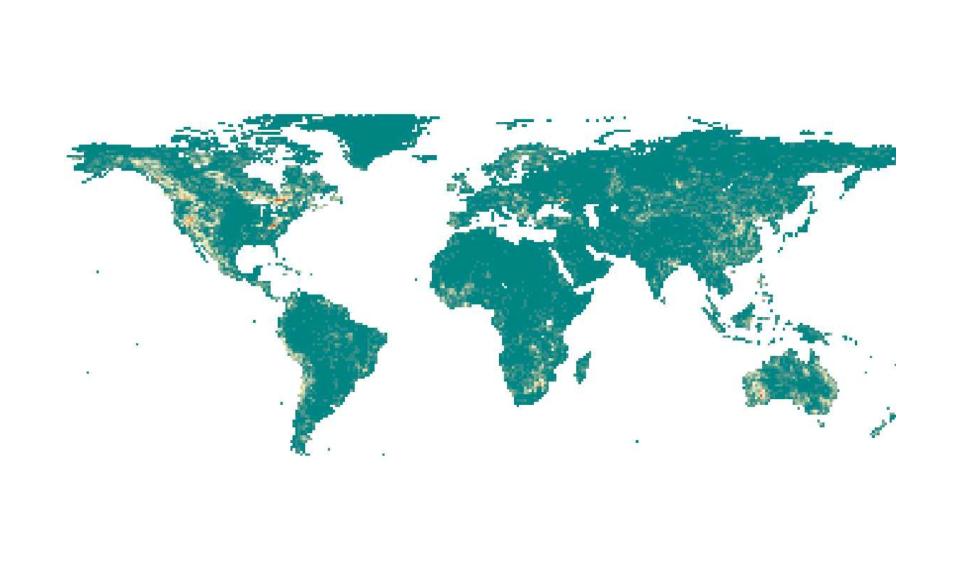-
Date:
From 23 Mar 2026 until 27 Mar 2026
-
Deadline for Applications:
13 Feb 2026
-
Location:
Faculdade de Ciências da Universidade de Lisboa, Campo Grande 1749-016 Lisboa
-
Duration:
36 hours (contact hours)
-
Schedule:
9h00-18h00, Monday-Wednesday; 9h00-18h30, Thursday-Friday
-
Lecturer or Responsible:
Pedro Cardoso (CE3C-MLE, CHANGE), Filipa Soares (CIBIO, ISA), Luis Borda de Água (iDiv, CEABN), Nuria Macias (ULL, Spain), Alice Nunes (CE3C-ECOR, CHANGE), Joana Ribeiro (CIBIO, ISA)
-
Department Responsible:
Departamento de Biologia Animal e Biologia Vegetal, Faculdade de Ciências da Universidade de Lisboa
-
Nº (min - max) Students:
10-16
Objectives
This hands-on course, limited to a small number of participants, aims at those who are looking for basic macroecology theory and statistics training and wish to get familiar with some of the potential uses of multiple advanced methods. This course will incorporate theoretical and practical classes, where the participants will acquire experience in different software packages and how to use the plethora of options available for large spatial and temporal scale analyses.
Participants must be present at 85% of the contact hours (meaning they can miss one half-day) and actively participate in all activities.
This course may have a correspondence in terms of credits toward PhD programmes at CIÊNCIAS or programmes jointly offered by CIÊNCIAS and partner institutions, with 6–7 hours of contact time per ECT, depending on specific requirements. For these students, in addition to the exercises completed during the week, submission of a written report two weeks after the course is mandatory. For programmes with fewer contact hours per ECT (6h/ECT), students must complete an additional assignment (a summary report). If necessary, 1 or 2 extra contact hours may be added. These reports are also recommended for other PhD students seeking recognition of the course by their institutions.
Minimum requirements: BSc in Biology/Ecology or related areas, basic knowledge of R language.
Directed to: PhD or advanced MSc students, postdoc or junior researchers.
General plan
Day 1
Morning - T01: Introduction to Macroecology
09h00-10h00 - Introduction to macroecology
10h00-11h00 - Fundamental patterns in macroecology
11h00-11h30 - Coffee break
11h30-13h00 - Scaling in ecology
13h00-14h00 - Lunch
Afternoon - P01: Data in macroecology
14h00-15h00 - Distribution databases
15h00-16h00 - Data acquisition and cleaning (part 1)
16h00-16h30 - Coffee break
16h30-18h00 - Data acquisition and cleaning (part 2)
Day 2
Morning - T02: Tools and methods in macroecology
09h00-10h00 - Basics of taxonomic diversity
10h00-11h00 - Spatial statistics
11h00-11h30 - Coffee break
11h30-13h00 - Null models
13h00-14h00 - Lunch
Afternoon - P02: Statistical methods in practice
14h00-15h00 - Case study integration for spatial analysis
15h00-16h00 - Spatial data analysis (part 1)
16h00-16h30 - Coffee break
16h30-18h00 - Spatial data analysis (part 2)
Day 3
Morning - T03: Concepts and applications in phylogenetic diversity (PD)
09h00-10h00 - Diversification rates and community assembly
10h00-11h00 - Understanding phylogenetic signal in ecological data
11h00-11h30 - Coffee break
11h30-13h00 - Phylogenetic diversity metrics
13h00-14h00 - Lunch
Afternoon - P03: Phylogenetic diversity in practice
14h00-15h00 - Building trees for community ecology
15h00-16h00 - Phylogenetic data analysis (part 1)
16h00-16h30 - Coffee break
16h30-18h00 - Phylogenetic data analysis (part 2)
Day 4
Morning - T04: Concepts and applications in functional diversity (FD)
09h00-10h00 - Definition of functional traits
10h00-11h00 - Community assembly through functional traits
11h00-11h30 - Coffee break
11h30-13h00 - Functional diversity metrics
13h00-14h00 - Lunch
Afternoon - P04: Functional diversity in practice
14h00-15h00 - Trait databases
15h00-16h00 - Functional data analysis (part 1)
16h00-16h30 - Coffee break
16h30-18h30 - Functional data analysis (part 2)
Day 5
Morning - T05: Concepts and applications in global conservation
09h00-10h00 - Species conservation prioritization
10h00-11h00 - The macroecology of invasive species
11h00-11h30 - Coffee break
11h30-13h00 - Ecosystem services at global scales
13h00-14h00 - Lunch
Afternoon - P05: Conservation in practice
14h00-15h00 - Threat databases
15h00-16h00 - Conservation analysis (part 1)
16h00-16h30 - Coffee break
16h30-18h30 - Conservation analysis (part 2)
Fees
Free for 1st year PhD students in Doctoral programmes at CIÊNCIAS (e.g. Biology), Biodiversity, Genetics and Evolution (BIODIV ULisboa; UPorto), Biology and Ecology of Global Changes (BEAG ULisboa, UAveiro) and Sustainability Science (ULisboa, several institutions), when the course counts credits for their formation, in which case the delivery of a final report done after the course is mandatory; the course is also free for more advanced PhD students of the BIODIV programme (ULisboa or UPorto); 50 € for more advanced PhD students of CE3C; 70 € for PhD students of the PEERS network (CFE); 125 € for CIÊNCIAS Master students and unemployed; 180 € for BTI, BI and other PhD students; 250 € for professionals and postdocs.
When the maximum number of students is reached, 10 vacancies will be available for non-paying 1st year PhD students mentioned above, being, by order of preference, students from: 1) CE3C; 2) BIODIV (not from CE3C); 3) CIÊNCIAS (not from CE3C); 4) Sustainability Science (not from CE3C or CIÊNCIAS); 5) BEAG (not from CE3C or CIÊNCIAS).
How to Apply
Candidates should complete the following APPLICATION FORM:
http://inqueritos.ciencias.ulisboa.pt/index.php/289591?lang=pt
This form is strictly confidential, as explained in the introduction, and will be used solely for the application process.
When filling out the form, mind to:
- FILL ALL THE MANDATORY FIELDS;
- UPLOAD CV AND MOTIVATION LETTER, both mandatory; use the names as instructed;
- If you want to resume later, SAVE the form; otherwise, you will need to fill everything out again;
- At the end, SUBMIT the form before exiting.
If you have any questions, please contact the coordinator of the CE3C Advanced Courses, Margarida Matos (mmmatos@fc.ul.pt), and the teacher, Pedro Cardoso (pmcardoso@ciencias.ulisboa.pt).


